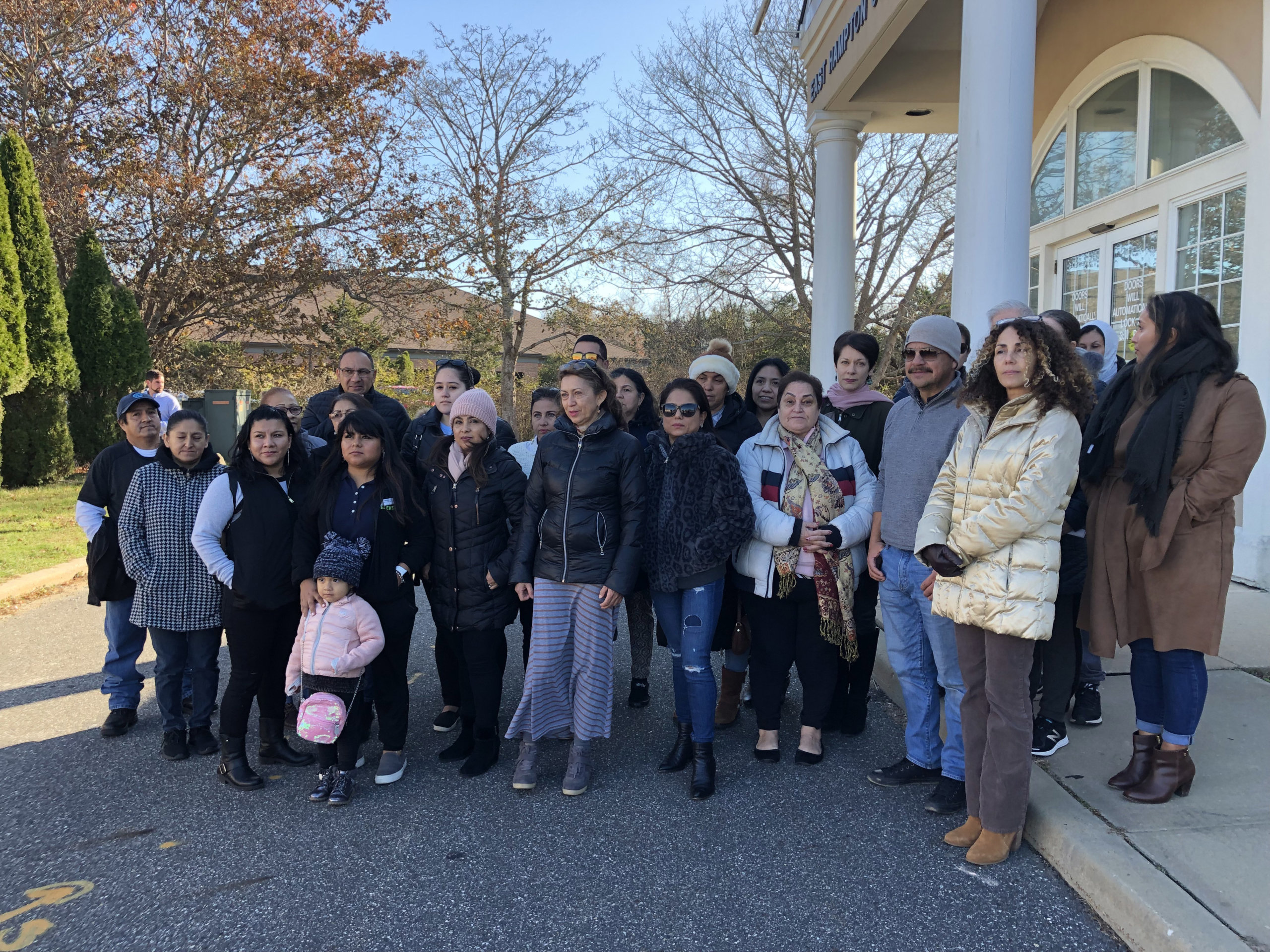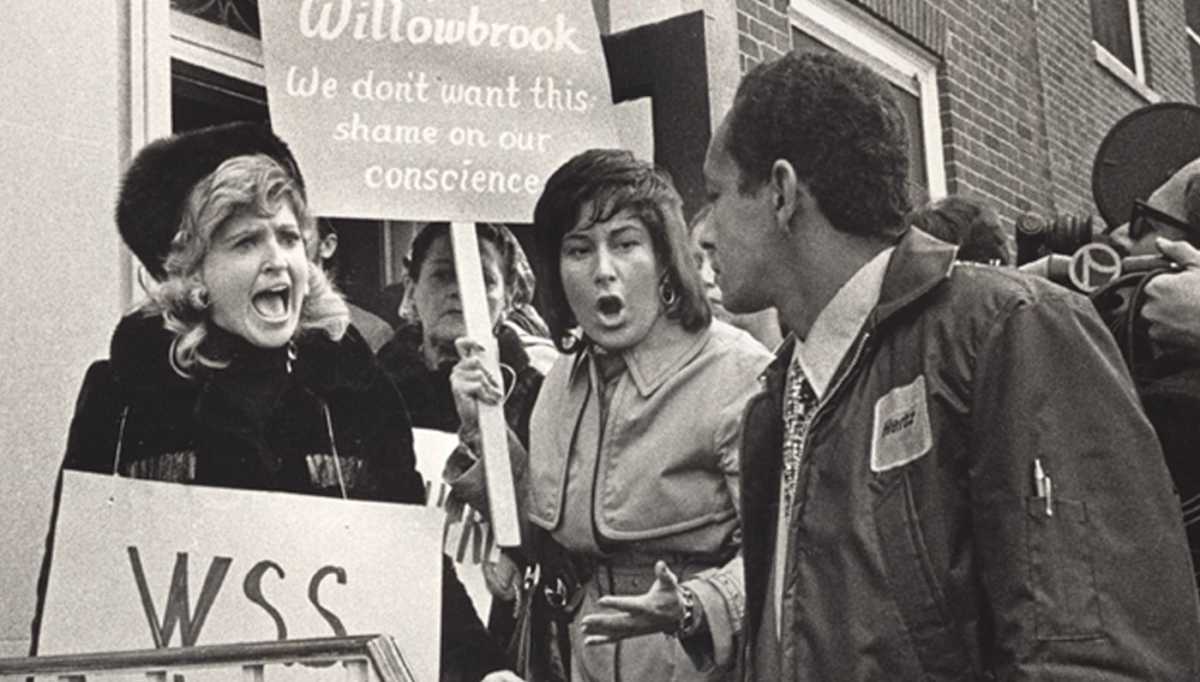Justice Demanded For Montauk Victim


About 40 members of the Latino community, many from Montauk, stood up and walked out of East Hampton Town Justice Court November 21 as a call for justice for the 28-year-old Colombian, John James Usma-Quintero, who was struck and killed by an alleged drunk driver, Lisa Rooney, the evening of October 30.
The walkout was coordinated by the Organización Latino-Americana of Eastern Long Island.
Rooney, the daughter of New York State Supreme Court Justice Bruna DiBiase, who serves in the criminal courts division in New York City, had been scheduled to make a court appearance that day. It would have been her first since she was arraigned October 31 on a single misdemeanor charge of driving while intoxicated in Montauk. However, a newly-retained attorney, Marc Gann of the Mineola law firm Collins Gann McCloskey & Barry PLLC, presented the court with a letter the day before, requesting an adjournment. Gann wrote: “Ms. Rooney is in an inpatient treatment center in Connecticut.”
According to the law firm’s website, Gann “is one of the most highly regarded criminal defense lawyers on Long Island, and has handled countless high-profile cases across the New York metropolitan area. He handles criminal cases of all shapes and sizes, from simple traffic or DUI cases to the most serious major felonies.”
A letter from the treatment facility, which was attached to Gann’s request, stated that Rooney entered the facility November 2, two days after she was arraigned in East Hampton, and will remain there until December 1.
Gann asked in the letter for a January court date, saying the district attorney’s office had agreed to the delay. However, East Hampton Town Justice Lisa Rana scheduled Rooney for her first criminal calendar date after the defendant’s release from the treatment center, December 11.
An indictment appears imminent. In Gann’s letter to the court, he wrote that he expects the case to be moved to county court by the time of her next appearance. Such a move would occur under one of two circumstances; either an indictment on felony charges, or as the result of a plea bargain called “superior court information,” in which Rooney would plead guilty to one or more felony charges. Felony cases can only be adjudicated at the state court level.
At the time Rooney allegedly struck Usma-Quintero with her 2019 Chevrolet Silverado, he was riding a bicycle northbound on Flamingo Avenue in the shoulder lane. Flamingo Avenue is the wide main road between downtown Montauk, where Usma-Quintero worked, and the Culloden Shores dock area of Montauk, where both lived. Bicyclists are a common sight on Flamingo, day and night.
Rooney, who was headed in the same direction, allegedly veered into the shoulder lane, where she struck Usma-Quintero, crushing the bike, and the victim’s chest. The Silverado continued traveling in the shoulder lane until it finally struck a guard rail with enough force that it sheared the rail off its stanchions. The guard rail was about a football field’s length away from where the victim was allegedly struck.
Police said that when they questioned Rooney, who they say was intoxicated, at the scene she was unaware that she had struck Usma-Quintero. She initially refused to take a test to determine what drugs, if any, and in what quantity could have been in her system, police said, but was forced to have blood drawn after police obtained a court order. The results of that test will be known at Rooney’s next court date, if not sooner.
The district attorney’s office, along with homicide detectives from Suffolk County and East Hampton Town’s police departments, have been putting a lot of resources into the investigation. According to several Montauk residents, police took the unusual step November 14 of taking the Silverado from the town police impound yard, where it has been stored since the accident, and bringing it back to the crime scene. Flamingo Avenue was closed off in both directions as a forensic science team mapped out the exact sequence of events before and after the fatality.
Quintero was in the country on a work visa, sending money home to his two daughters in Colombia. He was extremely popular, particularly in the Latino community in Montauk, and was known to many at the local 7-Eleven he worked at. A shrine in his honor arose at the spot where he was struck, where bereaved friends and family leaving flowers.
When she was originally arraigned, Rana set bail at $1000. She explained at the time that the state legislature has eliminated bail for all drunken driving cases starting January 1, 2020, and she was acting in recognition of that fact. Any bail collected would have to be refunded by the court by December 31.
Family members present October 31 did not understand the rationale given. “A thousand dollars to get out after killing somebody? It doesn’t make sense,” Usma-Quintero’s aunt Mercedes Giaraldo said at the time.
The Latino community fears the incident will be overlooked, according to those on-hand at the courthouse November 21. When Rana took the bench, in recognition of those in the courtroom in support of Usma-Quintero, she began explaining the new law to those in attendance, which was translated into Spanish. But the group stood up and walked out, en masse.
Outside, they spoke about their feelings and objectives. “Everyone deserves justice,” one woman said. “The laws here are right, but the people enforcing the laws are wrong. We expect them to do the right thing.” She said they sought the truth. “We want this to go the right way,” she said. “We are demanding truth and justice.”
Minerva Perez, executive director of OLA, and Sandra Dunn, the organization’s associate director, led the group on a walk to nearby Town Hall. There, they spoke for several minutes.
Perez said that it is important for the law enforcement agencies to reach out to the community. She asked why that hasn’t happened so far, and why the investigators have not tried to communicate with the Spanish-speaking community in their search for information about the incident.
Dunn said the group was staying in contact with each other about the case, but not through major sites like Facebook. She acted as translator for the group. One woman said, “We don’t want things to blow up on Facebook. We just want to keep things calm and correct.”
“As time goes by,” another woman said, “I think it is important that we don’t let our presence fade away. We need to stay united as a front.”
t.e@insyeastend.com



